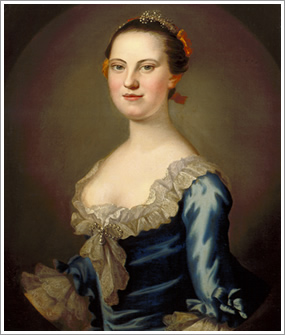Mary Willing Byrd facts for kids
Quick facts for kids
Mary Willing Byrd
|
|
|---|---|

Portrait by John Wollaston; original in the collection of the Virginia Historical Society, Richmond
|
|
| Born |
Mary Willing
September 10, 1740 |
| Died | March 1814 (aged 73) |
| Spouse(s) | William Byrd III (d. 1777) |
| Children | 10, including Charles Willing Byrd |
| Parent(s) | Charles Willing Anne Shippen |
| Relatives | Thomas Willing (brother) Elizabeth Willing Powel (sister) Edward Shippen (great-grandfather) |
Mary Willing Byrd (born September 10, 1740 – died March 1814) was an important American woman who managed large farms, known as plantations, during a challenging time in history. She was the second wife of William Byrd III, a military officer from Colonial America. His father founded the city of Richmond, Virginia. Mary's own father, Charles Willing, was the mayor of Philadelphia from 1748 to 1754. Her great-grandfather, Edward Shippen, was also a mayor of Philadelphia earlier, from 1701 to 1703.
Contents
Mary Byrd's Life and Family
Mary Willing Byrd lived during a time when America was becoming its own country. She was part of a well-known family. Her husband, William Byrd III, was a Colonel in the military. He was a significant figure in the Thirteen Colonies before the American Revolution.
Managing Westover Plantation
In January 1777, Mary's husband passed away. He left behind many debts, which are like money owed to others. Mary took on the huge task of managing his large plantations. One of the most famous was Westover Plantation in Charles City County, Virginia. Her goal was to pay off the debts and save some property for her ten children.
Mary worked hard to keep the family's land. She sold some properties, including land in the west and homes in Richmond and Williamsburg. But she successfully kept control of Westover, which was the main Byrd family plantation. This showed her strong business skills and determination.
Mary Byrd and the American Revolution
The American Revolution was a war where the American colonies fought for independence from Britain. Mary Willing Byrd had many connections to the British side and to people called Loyalists, who supported Britain. Despite these ties, she tried very hard to stay neutral. This meant she did not want to pick a side in the war.
Accused of Helping the Enemy
During the war, some of her property was taken by the British. When she tried to get it back, the state of Virginia accused her of trading with the enemy in 1781. This was a serious charge.
Mary defended herself in a powerful letter to Governor Thomas Jefferson. She wrote, "I wish well to all mankind, to America in particular. What am I but an American? All my friends and connexions are in America; my whole property is here—could I wish ill to everything I have an interest in?" Her trial was put off and never actually happened. Her words showed her loyalty to America, even with her family connections to Britain.
Legacy and Recognition
Mary Willing Byrd was a strong and capable woman who faced many challenges. In 2007, she was honored by the Library of Virginia. She was included in their "Virginia Women in History" program. This program recognizes women who have made important contributions to Virginia's history.
 | Janet Taylor Pickett |
 | Synthia Saint James |
 | Howardena Pindell |
 | Faith Ringgold |

